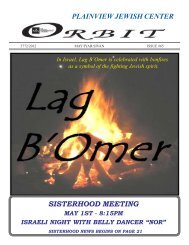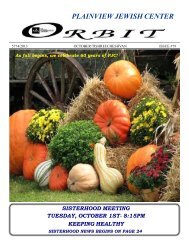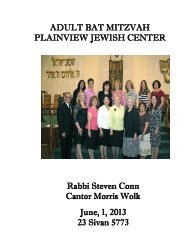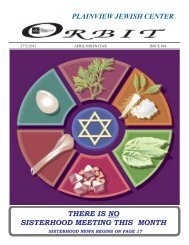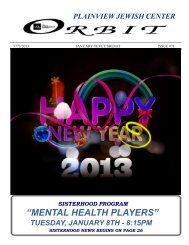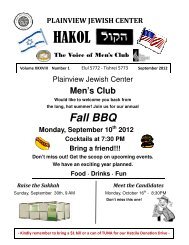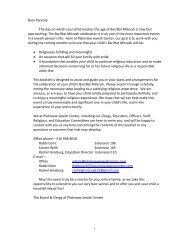Orbit February 2012 - Plainview Jewish Center
Orbit February 2012 - Plainview Jewish Center
Orbit February 2012 - Plainview Jewish Center
Create successful ePaper yourself
Turn your PDF publications into a flip-book with our unique Google optimized e-Paper software.
Israel Affairs by Sharon Kunoff<br />
ORBIT<br />
Page 26<br />
In last month’s article, I talked about how the situation with the Haredi interpretation of Judaism<br />
has caused problems in many areas of main stream Israeli life. Previously, I indicated how the ultrareligious<br />
streams have always had a disproportionate impact due to political considerations that<br />
date from the earliest founding of the State. David ben Gurion, in order to have a working majority in<br />
the formation of the country, agreed to many demands of the religious right. In our day, that right has<br />
gotten so extreme in its views, both in Israel, and in some cases even in this country, that it is almost<br />
impossible for other religious streams to even have a conversation with them. Perhaps, as their<br />
views become more extreme, it may become evident to the Israeli government that the situation has<br />
to be changed. There has been some evidence of this, in that the Israel Supreme Court has ruled<br />
that it is illegal to force women to sit in the back of the bus. In this article I want to give an example of<br />
how the Masorti movement is gaining recognition by the Israeli Government.<br />
“I came here this evening to hear women singing,” Shimon Peres, President of Israel, said<br />
Jan. 5th after a performance of the Masorti youth movement’s coed singing troupe at a dinner to<br />
mark the movement’s founding 35 years ago. He continued, “Fringe extremist groups facing Israeli<br />
society today are not new, but that it has become more difficult to overcome the extremists’ rhetoric<br />
and find common ground. I am aware that they are the extreme margin, and believe that the majority<br />
of Haredi, Dati-Leumi and secular communities seek to live together in a spirit of mutual respect,<br />
tolerance and brotherhood. And to each their way of life, for democracy in our time is not only the right<br />
to be equal, but also the equal right to be different.... The problem is that this marginal minority<br />
breaches the law. They are a law unto themselves, and slander the country. They disgrace the state.”<br />
Peres praised the Masorti movement for establishing itself in Israel, “building a large number<br />
of communities and synagogues throughout the country, and winning hearts.” “Different streams<br />
exist in Judaism, which has room for conservative and liberal viewpoints, for those who abide by the<br />
613 commandments and those who say ‘Sh’ma Israel, ” Peres said. “To be a Jew is not a matter of<br />
public relations, but to be historically part of a great collective spirit that crossed oceans of hardships,<br />
deserts of suffering. And which never stopped yearning for the Promised Land, nor abandoned the<br />
aspiration to be the chosen people. A light unto nations.” He also praised the movement’s NOAM<br />
youth movement and its bar/bat mitzvah program for children with special needs.<br />
As recent tensions throughout Israel surrounding women’s exclusion increase, the Rabbinical<br />
Assembly sent out a fascinating text from a 15th century Siddur that provides an example of a<br />
<strong>Jewish</strong> woman’s striving for equality and a prominent rabbi’s affirmation that such equality is “kosher”.<br />
”Blessed are You For Not Creating Me a Woman” is a blessing recited every morning by<br />
observant <strong>Jewish</strong> men, originally found in the Talmud. A fixed part of the morning liturgy, this passage<br />
demonstrates the challenges to contemporary men and women presented by the sexist nature of the<br />
traditional text. The traditional blessing for women, “Blessed Are You For Creating Me as You Wished,<br />
tacitly reinforces the traditional male blessing. A steadily growing cadre of contemporary liturgists<br />
has struggled to address the gender inequalities in <strong>Jewish</strong> tradition. A well-preserved and rare<br />
Siddur from the year 1471, in the collection of the <strong>Jewish</strong> Theological Seminary (JTS) library, provides<br />
a bold alternative. Instead of the “traditional” female morning blessing we find in traditional prayer<br />
books, which reads, “Blessed are You, Lord our God, Master of Universe for Creating me According<br />
( continued on Page 27 )





